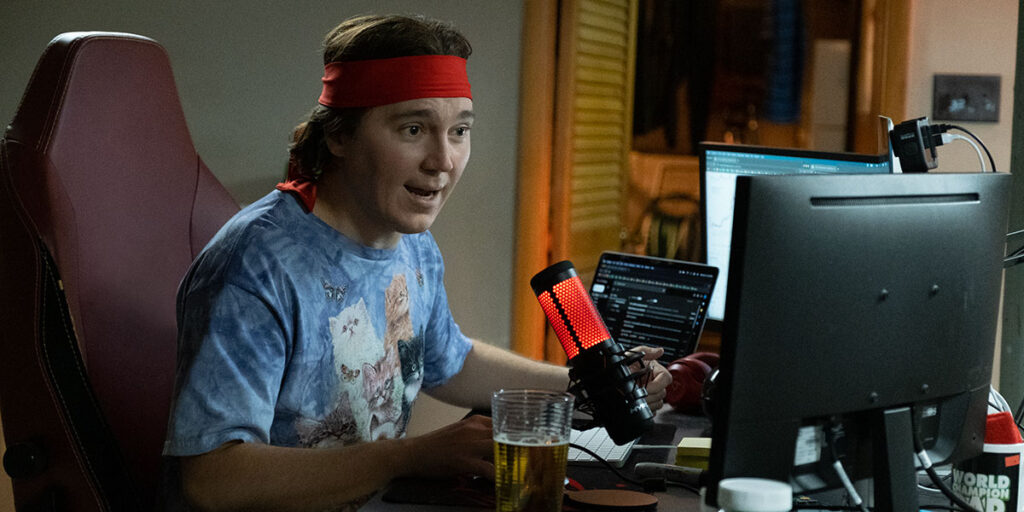
Dream Scenario (2023 | USA | 100 minutes | Kristoffer Borgli)
Nicolas Cage is currently on an incredible run of having the best, most interesting, time reckoning with his own fame on film. In a provocative new comedy, director Kristoffer Borgli has his as Paul Matthews, an aging college professor of evolutionary biology with lingering regrets that his career has been consumed by teaching instead of research. A family man with a loving architect wife (Julianne Nicholson) and two teenage daughters, he’s a balding, bespectacled, and bearded teacher whose near-anonymity comes to a crashing halt when he starts appearing as an inert inconsequential guest star in the dreams of friends, students, and strangers.
At first, his presence as an anti-Freddy Kruger becomes a launchpad for the recognition he’s long sought. Like latter day Cage, Paul becomes something of a living meme whose fame is orthogonal to his own work, making for a resonant hall of mirrors. As he revels in the spotlight and attempts to capitalize on the unearned notoriety (with a smart appearance by Michael Cera), the film morphs into a cutting commentary on the attention economy and the perils of being an asymmetric presence in the lives of others.
Too sophisticated to lean on a single comedic note, Borgli takes a sharp dark turn into horror as the dream realm intrudes on reality. Unsettling nightmares have unspool Paul’s real life through no fault of his own. Cage’s richly realized commitment to the role through modest success to frustratingly beleaguered outcast also makes for very funny and incisive commentary on cancel culture. What could’ve easily been a one-note premise becomes a surreal and affecting investigation of the incredible weight of mass psychosis.
Dream Scenario had its world premiere at the Toronto International Film Festival

Dumb Money (2023 | USA | 104 minutes | Craig Gillespie)
Was 2020 really three years ago? The early days of the pandemic, essential workers, uncertain isolation, pods, and individuals speculating on the stock market with stimulus checks feels like both yesterday and a lifetime ago. Craig Gillespie revisits that one strange facet of recent history with an inverse Big Short, a multifaceted star-studded take on the feverish rise of Game Stop’s stock (or, “stonk”) that captivated financial news and pitted redditors against the massive hedge funds who callously refer to individual “retail” investors as “dumb money”.
Rather than taking a position on the fundamentals of whether the declining video game store (which deemed itself an essential business) was truly a good investment, he instead situates wild story of r/WallStreetBets among a cross-section of individual small time players who followed Keith “Roaring Kitty” Gill’s livestreams all the way to the moon. Paul Dano is terrific as the soft-spoken analyst who saw so-called “deep fucking value” in a highly-shorted stock and told the internet all about it from basement livestreams clad in a trademark bandana and an array of cat t-shirts. Aside from getting to know his family (most notably a brother played by Pete Holmes perpetually busts his balls and Shailene Woodley as true believing wife), we also follow a nurse (another good turn from America Ferrera), some college students who invest using OnlyFans payments, and even a Game Stop employee who were among the legions who followed his advice and jumped aboard the craze early and held faithfully as the stock defied expectations and soared.
Their are counterposed with the obscene wealth of a billionaire hedge fund managers whose pandemic existences were very different from most people’s. Chief among them is Seth Rogen as Gabe Plotkin, whose firm Melvin Capital bet heavily against the success of the company and whose vast short positions were most thwarted by the steadfast investments of true believers. Vincent D’Onofrio appears as a pig-owning Steve Cohen who relocated his firm to a bought out resort; and Sebastian Stan as the more nefarious half of the techbro duo who ran RobinHood with some decidedly shady practices. Like the small-time investors, each of their absurd net worths also flash on the screen with each introduction, spotlighting the vast gulf between their stakes and circumstances.
The story moves as an entertaining clip, mixing narrative, internet clips, and backstories to give life to each of the characters. It’s somewhat informative, but is most of all consistently fun and resolutely populist. There’s a fury for the disregard of the consequences of callous investment firms and a mournful recollection of the hardest days of the pandemic. As the true story reached a fevered pitch soaring prices and congressional investigations, I found myself strangely emotional to see words like “diamond hands, HODL, and smooth brained” and ridiculous ape memes flashing on a big screen. What a long, strange, trip it continues to be. I think we’ll all be processing it for a very long time.
Dumb Money had it’s world premiere at the Toronto International Film Festival.

Monster (2023 | Japan | 126 minutes | Kore-eda Hirokazu)
They say there are three sides to every story — yours, mine, and the truth — but I’m not sure that any perspective shown in Kore-eda Hirokazu’s elegant fragmented examination of school bullying is entirely accurate. Set across a few eventful days in a Japanese lakeside town in the prelude and aftermath to a towering inferno that consumes a hostess club, it’s all the better for the ambiguity embedded in each of its multifaceted perspectives.
Working for the first time in decades from a script he didn’t write entirely himself, Kore-eda and co-screenwriter Sakamoto Yûji focus first on a widowed single mother (an excellent Sakura Andō). Her fifth-grade son is becoming increasingly mysterious and closed off to her and she suspects mistreatment from a teacher at school (one whose reputation was suddenly tarnished by being spotted leaving the burning club). With a mix of fear of her son’s trajectory and anger at the school’s seeming indifference, she forges through a bizarrely polite and alien bureaucracy to assure the best for her child. Later, we see the scenes repeat from the misunderstood teacher’s (Eita Nagayama) decidedly different point of view. Each believe they are acting in the best interests of the children in their care; that neither can quite see the whole picture sparks the emotional resonance for the remainder of the film.
The final act brings the audience as close as we might get to the truth of the matter, through perspective of evocative child actor Sōya Kurokawa. Kore-eda is reliably wonderful at drawing the best from children and this film is no different. Here, with a lift from Ryuichi Sakamoto’s poignant final score, he evokes the pervasive confusions that accompany boys on the cusp of adolescence. From socially stifling schoolroom scenes to rare glimpses of freedom in the idyllic sun-dappled green outdoor spaces and hidden clubhouses, we gain rare access to the tumultuous inner world of the kids at the misunderstood core of the drama.
The words “monster” and “alien” are thrown around casually amongst characters across the film, to varying intention and effect. But the film itself has the greatest empathy for each of its characters and the confusions they face. By granting us access to these misunderstandings it also celebrates the fleeting joys and trying sorrows of life while imagining a dreamy promise of rebirth.
Monster had its North American premiere at the Toronto International Film Festival
This piece was written during the 2023 SAG-AFTRA strike. Without the labor of the actors currently on strike, the film being covered here wouldn’t exist. More information about the strikes can be found on the SAG-AFTRA Strike hubs. Donations to support striking workers can be made at the Entertainment Community Fund.



